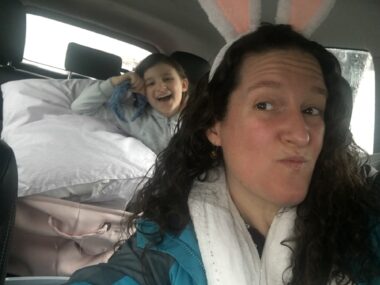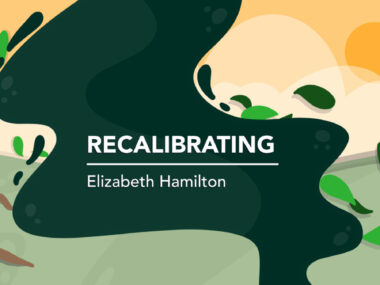Self-talk is important when parenting through challenges
How talking to herself in the mirror benefits this FA parent
Written by |

I have a secret: I talk to mirrors. Six years ago, I would’ve pulled out a Diagnostic and Statistical Manual of Mental Disorders with some concern about that, but much has changed since then — one of the biggest changes being my daughter’s diagnosis of Friedreich’s ataxia (FA). The habit began almost five years ago, and I haven’t felt the need to break it. In fact, I encourage it.
My first conversation occurred when I excused myself from the suffocating clinic room with caving-in walls and buzzing overhead lights. It was a short conversation: “You can do this. You can do this. You’re stronger than this. Steel up. She needs you.” I remember repeating this as I stared down my reflection. My fear of being enough for my child hung like a shadow. The role I thought I’d play as a parent was changing.
In that moment, it wasn’t my appearance that mattered, but how I showed up as a parent. Dye had been pumped into a small body, images taken, and we were waiting. For what? I wasn’t even sure. I just knew that when doctors strike a low tone and make appointments with speed, the phrase “this is probably nothing” provides no comfort.
I made it through that day and the following month as testing increased. Then “nothing” became “something.” I showed up with courage to match that of the child who was watching me.
Looking in the mirror
Since that time, I’ve learned the importance of mirrors, both real and metaphorical. Mirrors capture that moment, the space we’re in now. So when I spiral, when I ruminate over the past or fret about my daughter’s future, my mirror reminds me to be here now. The present is the only thing I can influence in this moment.
As a practicing social worker, I used to tell team members working with children that we hold mirrors and telescopes. The mirror reminds our children of who they are and helps them see the beauty they hold and the strengths they possess. The telescope is to help them see their past with the wisdom of experience and to remind them what they’ve been through and overcome. Turned in the other direction, a telescope can help us see what’s possible on our journey forward.
Like most people who find themselves on the receiving end of their own advice, I use these tools with my daughter now. When we have moments of worry or frustration, I remind her who she is. I remind her of the strengths she possesses, the beauty she holds. I also remind her of our reality: that falls create risk and we must match that risk with creative problem-solving and self-advocacy. I am her mirror. I also hold her telescope.
My child is cut from tough fabric. The very fabric that carries the GAA repeat that caused her FA also carries an array of characteristics that I see in her. I tell her stories of her family, their struggles and their triumphs. I wrap her in the blanket her uncle gave me, or the quilt crafted by her great-grandmother, and say, “Do you feel their hug?” I remind her of all the hard things she has done in her short life and how she was the youngest patient at the National Institutes of Health to complete a Goldmann visual field test at age 7. This always makes her smile; Amelia, my daughter, is competitive like her mother.
The future is such a nebulous thing in this FA journey, but to quote a doctor we saw many years ago, “The science is advancing.” I let my optimism advance right along with it while I stay grounded in today. My telescope holds realistic hope, and I can see it on the horizon for all who share in this journey.

Traveling on Easter Sunday to be seen by a doctor in Philadelphia. (Photo by Elizabeth Hamilton)
I still talk to mirrors, and I don’t plan on stopping. “You can do this. You are stronger than you know. How you show up today truly matters. Failures are a chance to learn, so embrace them. You’re doing a really good job. I believe in you.”
In that mirror, I see a mom who’s showing up, and that is enough.
Note: Friedreich’s Ataxia News is strictly a news and information website about the disease. It does not provide medical advice, diagnosis, or treatment. This content is not intended to be a substitute for professional medical advice, diagnosis, or treatment. Always seek the advice of your physician or another qualified health provider with any questions you may have regarding a medical condition. Never disregard professional medical advice or delay in seeking it because of something you have read on this website. The opinions expressed in this column are not those of Friedreich’s Ataxia News or its parent company, Bionews, and are intended to spark discussion about issues pertaining to Friedreich’s ataxia.




Tiffany Sippel
Thanks...I needed that! My son was diagnosed with FA the day after he turned 17. I felt physically sickened and beat up by the news. Now 2 years later...I turned 52 on Friday and had a serious reflection back to see all the things I have learned, found out, discovered, fought for, created. I am able to say I am amazed with myself. I appreciate this article so much because us moms need to toot our own horn! Over the last two years I have worked with my son to: find an amazing personal trainer that specializes in visual and vestibular training while strength training, an awesome physical therapist through California Children's services, college tuition/books/parking covered through department of rehabilitation, medi-cal coverage, ready and waiting for Skyclarys with a $0 monthly copay, SSI to supplement his part time work at the San Diego Zoo, a grant from Challenged Athlete's Foundation to cover some of the personal training cost, a t-shirt fund raiser to buy a recumbent trike, and best of all a free to us service dog from Canine Companions. That is a lot in 2 years! And I am surviving being a first grade teacher with weirdly wired post pandemic kids. Tough group! I like your view on the telescope. I have been working with a therapist on living in the moment. A diagnosis like FA makes it hard not to fret about the future. It is terrifying! I like your "cautious optimism" as I call it. Our genetic counselor told us at diagnosis time that he really felt there would be a treatment for FA in Gavin's lifetime. We know Skyclarys is not the answer, but it can be helpful and we are looking forward to seeing just what it can offer. I love your writing style and your sweet picture! Keep writing! Us mom's need this! Gavin is 19 and has a great Instagram account @fishing.gavin and his dog Epic has an account @Epic_and_fishing.gavin. Check it out. Family friendly for the most part...lots of work out videos. Thank you! Tiffany Sippel
Elizabeth Hamilton
That's amazing Tiffany! You go momma! I really appreciate you sharing of yourself. We have to pause on our way up the mountain to take our eyes off the peak and look at how far we have come! I write for you and then your comments inspire me! THANK YOU SO MUCH!